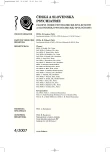-
Medical journals
- Career
Pharmacoresistant Schizophrenia
Authors: E. Češková
Authors‘ workplace: Psychiatrická klinika LF MU a FN Brno přednostka prof. MUDr. E. Češková, CSc.
Published in: Čes. a slov. Psychiat., 103, 2007, No. 4, pp. 190-197.
Category: Comprehensive Reports
Overview
The article deals with definition, measurement and treatment possibilities of pharmacoresistant schizophrenia. Recently, when evaluating pharmacoresistance, we have concentrated especially on persistent symptoms because there are treatment options preferentially influencing some symptoms (positive, negative, affective symptoms and cognitive dysfunction). As for treatment possibilities, attention is first paid to the use of high doses of antipsychotic, i.e. higher doses than officially recommended. Further possibilities include switch to clozapine and polypharmacotherapy. Clozapine is still considered to be a gold standard in this indication. Polypharmacotherapy, especially a combination of antipsychotics and augmentation by drugs primary not intended for treatment of psychosis are very frequent. Based on available data in stabilised schizophrenic patients, it seems that polypharmacotherapy is abundant in many cases. For this reason the individual medication should be considered carefully and individually taking into consideration the most troublesome persistent symptoms.
Key words:
pharmacoresistant schizophrenia, antipsychotics, high doses, clozapine, polypharmacotherapy, combination of antipsychotic, augmentation of antipsychotics.
Labels
Addictology Paediatric psychiatry Psychiatry
Article was published inCzech and Slovak Psychiatry

2007 Issue 4
Most read in this issue- Pharmacoresistant Schizophrenia
- History of Neurosurgical Operations for Pychiatric Disorders until 1950
- The Quality of Life after Resective Surgery for Medical Refractory Epilepsy
- Profile and Dynamics of Cognitive Performance in Antidepressant Treatment
Login#ADS_BOTTOM_SCRIPTS#Forgotten passwordEnter the email address that you registered with. We will send you instructions on how to set a new password.
- Career

